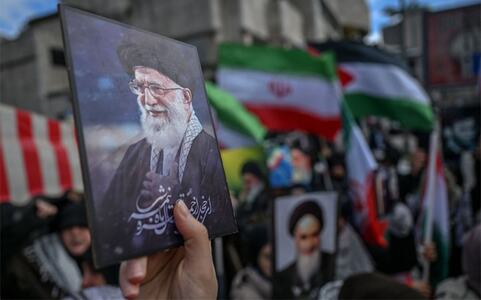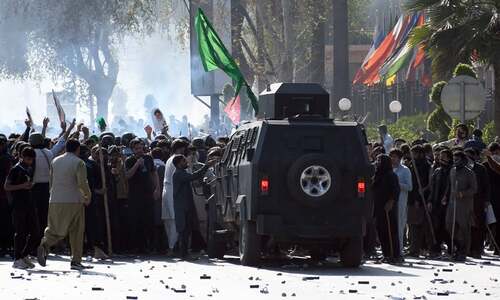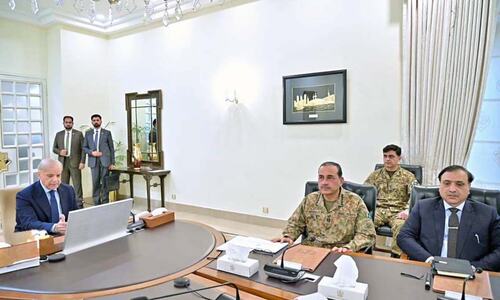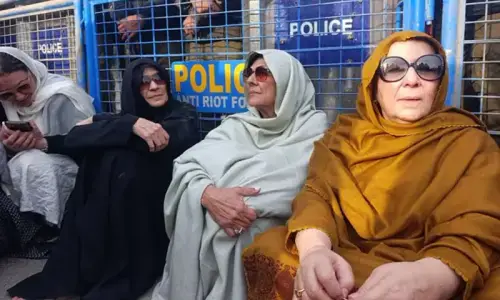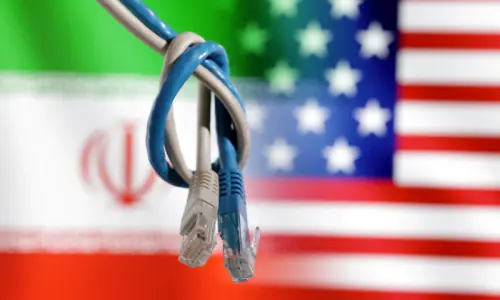KARACHI, Feb 25: A national conference on Balochistan and the issue of provincial autonomy, convened by the Muttahida Qaumi Movement on Saturday, demanded that a framework and schedule for complete provincial autonomy should be announced before the 2007 elections.
A four-point resolution adopted by the conference was read out by deputy convener and parliamentary leader of the MQM in the National Assembly Dr Farooq Sattar.
He said that the conference demanded provincial autonomy for all the federating units, including Punjab, because it was essential for peace, prosperity and national integrity. The conference was of the view that provinces, instead of the federation, should be strengthened.
Dr Sattar regretted that major opposition parties had stayed away from the conference which deliberated on serious national issues. He said the conference also demanded immediate end to the military operation in Balochistan.
Dr Sattar said that complete provincial autonomy and end of feudal system were necessary for Pakistan’s survival. The participants resolved that the demand for complete autonomy for the provinces was in conformity with requirements of the 21st century. They maintained that countries all over the world had emerged stronger by adopting this principle, and cited the examples of the US, UK and other developed democratic countries which had granted complete autonomy to their provinces (states) and district governments.
The conference called upon the competent authorities to give full provincial autonomy through a framework, the schedule of which should be announced before the general elections of 2007. It would be a great service to the people of Pakistan, a resolution adopted at the conference said.
The conference also resolved that internal and inter-provincial disputes be resolved through negotiations, instead of use of state power and force. The ongoing operations in Balochistan thus needs to be stopped immediately and negotiations started for resolving the crisis.
As a first step, a reconciliation committee comprising representatives of all parliamentary parties be constituted which may visit Balochistan and play a role in bringing all contending parties to a round-table conference.
Simultaneously, the conference stressed, the federal government should start implementation of the recommendations of the parliamentary committees on constitutional and political reforms in Balochistan.
It also resolved that outdated federal and tribal systems, including the jagirdari and sardari systems, should be abolished forthwith, for ensuring progress and prosperity of the country. But this is only possible when provinces are given complete autonomy.
The conference condemned the blasphemous cartoons published in some European newspapers and appealed to the electronic and print media to refrain from publishing derogatory material that hurt the feelings of followers of any religion.
Addressing the first session of the conference, Leader of the House in the Senate, Wasim Sajjad of the ruling Pakistan Muslim League, called for giving more powers to the provinces and said that stronger province would mean a strong Pakistan.
He urged all political parties to work for resolving the Balochistan issue through dialogue. Mr Sajjad expressed concern over the situation in which “instead of resolving the problem politically some people have resorted to violence”.
About recommendations of the parliamentary committee on Balochistan, he emphasised that since an amendment to the constitution could only be made through a two-third majority in both houses of parliament, it was imperative that all political parties in the legislature joined hands in introducing the amendment needed to be made. He said that the PML did not have the requisite strength for that purpose.
About the concurrent list, Mr Sajjad said there was also thinking among members of the committee that if the people of Pakistan thought that provinces should get more power and strength than the federal government, they should get it. But in view of international compulsions, the issue of terrorism and foreign investments, he said, certain powers must be retained by the centre.
He said the PML had proposed to slash the concurrent list from 47 to 28 giving powers to both the federation and provinces. The PML, he said, had also suggested revival of the Council of Common Interests which was a constitutional obligation under the 1973 document.
Unfortunately, this important body was not able to perform the task assigned to it. One reason was that some ministries and autonomous organisations like gas companies had resisted the move to call its meetings. The Muslim League had suggested that the council must meet every four months. The party had also recommended that the formula for sharing of finances between the centre and the provinces be amended to include backwardness as an important factor.
Federal minister Zubeida Jalal criticised the people who said that no development was possible under military rule. She pointed out that the education sector got a boost under Ayub Khan while under Ziaul Haq the communication network was beefed up.
Human Rights Commission’s Afrasiyab Khattak slammed the military operation in Balochistan and said there was evidence that planes and armour were used against civilians and a large number of people had been missing for a long time.
Former ISI chief Gen Hamid Gul called for fresh and transparent elections to steer the country out of the current crisis.
He claimed that a Balochistan-like situation also existed in Waziristan, Gilgit and other areas. He severely criticised the government and claimed that “very soon” people would hear “good news”.
He said that the military was not capable of running the affairs of the country and whenever it intervened it caused irreparable damage to the country.
Mr Taj Muhammad Langah, chairman of the Pakistan Saraiki Party, regretted that certain political parties had boycotted the conference. Mr Langah said that there should be more than four provinces in Pakistan.
Prominent poet and columnist Jamiluddin Aali observed that the definition of provincial autonomy was ambiguous in the constitution and it needed to be fully defined. Columnist M.B. Naqvi opposed the concept of a strong centre and demanded that provinces be given maximum autonomy.
Mr Nasrullah Kakar, chairman of Pakistan Workers’ Party, severely criticised what he called the misrule of tribal chieftains.
Kazi Asad Abid, editor-in-chief of daily Ibrat, and Dr Zameer, Sindh president of Pakistan Awami Tehreek, also participated in the deliberations.

